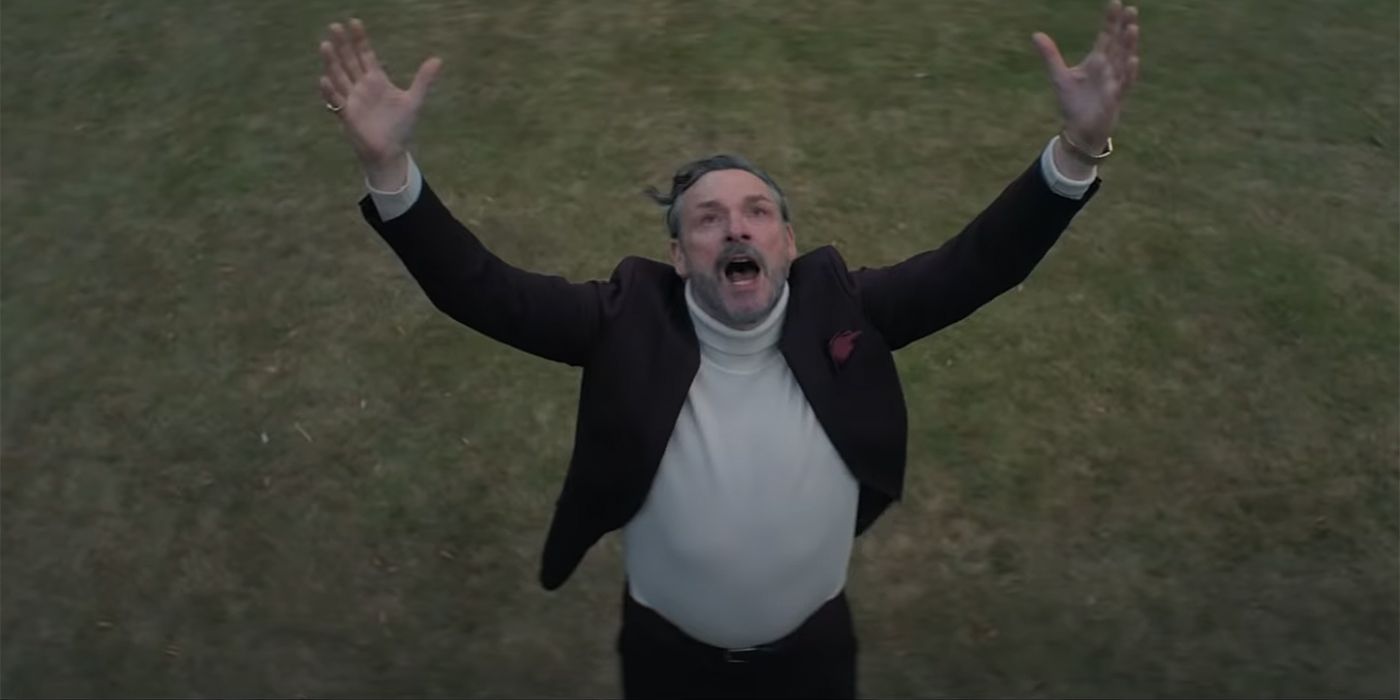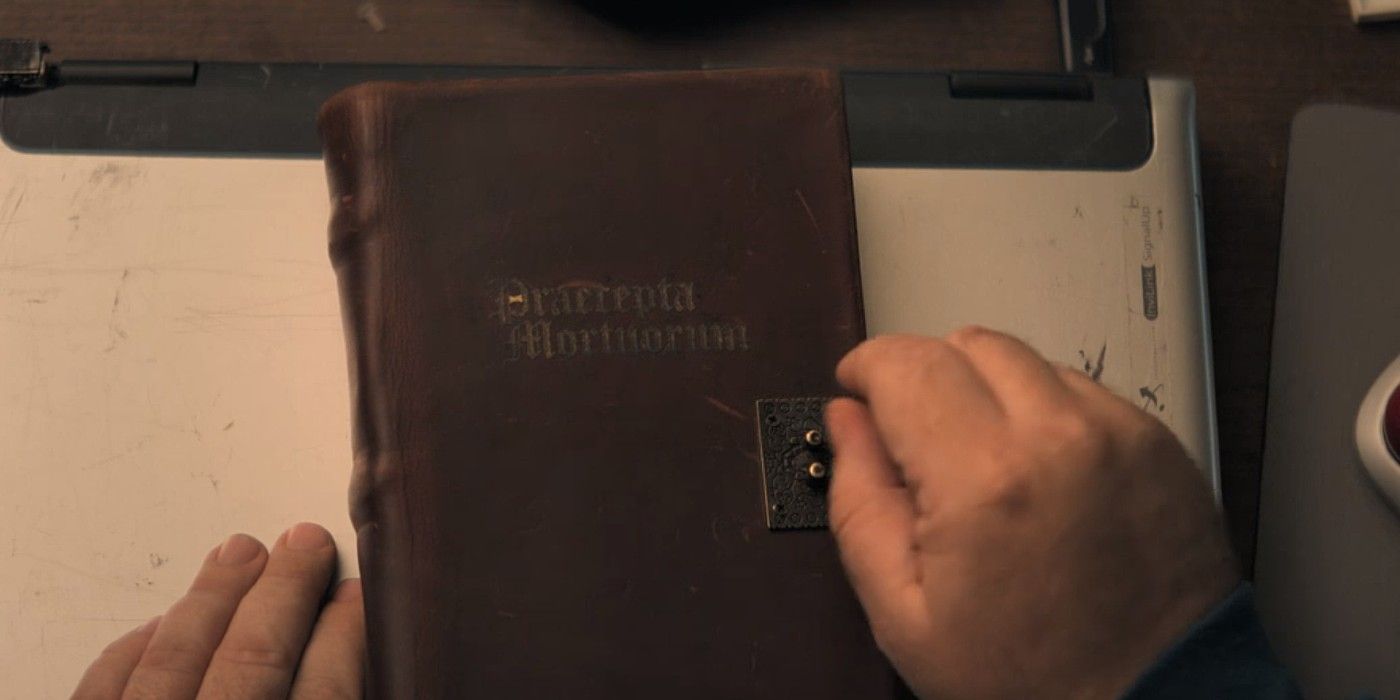Truth Seekers, the latest horror comedy from the minds of Simon Pegg and Nick Frost, just dropped its first season on Amazon Prime. The 8-episode series introduced viewers to experienced broadband installer Gus (Frost) and his rookie partner Elton (Samson Kayo), who find themselves searching for ghostly interference amidst their regular house calls.
But it isn't all fun and hauntings, as the show introduces the mysterious Doctor Toynbee midway through the season, played by Julian Barrett (The Mighty Boosh). While he first appears as a celebrity known to the crew, and a participant at the local cosplay convention, he quickly becomes a much more crucial part of the plot than they could have realized.
At a recent press event, Barratt spoke to Screen Rant and other outfits about his fascinating character arc and the joy of working on the series. The interview contains spoilers alluding to the second half of the season, so make sure you've finished watching before reading on.
How did you become involved with the show?
Julian Barratt: I was walking down a street in Soho and bumped into Simon Pegg - or, actually, he bumped into me. I was staring into a shop window full of guitars, which is my porn. I was sort of staring at these guitars, and then this and then I heard this voice behind me going, "Mmm, that's a nice guitar." I turn around, and it was Simon Pegg.
I was like, "Oh, wow, Sy. How you doing?" He went, "Oh, we've got some offices just here. And this is our new office." So, I said, "I'll come in and chat with you about some ideas." So, I went in and chatted to them about some stuff, and then they said they were doing this show. That was all in the space of a couple of weeks, actually. It was really, for me, just a strange coincidence of bumping into Simon.
When he talked about the show, there was this part in it, and it was just one of those things. I know Simon; I've known time for a long time because we started out together, doing stand up, and then we did a show together very early on called Asylum in the 90s or something. So, I've seen him along the road, but we haven't worked together much until this point. That was how it started.
What was it that drew you most towards the script and the role?
Julian Barratt: It's horror, it's comedy, it's Simon Pegg and Nick Frost. That's sort of all you need to know, as far as I can see. It was just a bonus of the scripts were good. I would have said yes if they give me a piece of paper with a drawing of a hedgehog on it. Which is, quite coincidentally, what the script was.
It was a wonderful to see you take on a sort of Scooby Doo villain, as it were. Could you talk about playing that role without going too arch or making him cartoonish, and about keeping him grounded within this already fantastical show?
Julian Barratt: Yeah, we spoke a lot about people who I like and performances I've enjoyed over the years. My sort of touchstone performances of this type of character are Christopher Lee in The Wicker Man, and I really liked Leonard Nimoy in the 1970s version of Invasion of the Body Snatchers. There's a few people like that I really liked. Obviously, I love John Carpenter, and we talked a lot about that. We just talked a lot about different things that we were being influenced by, and the level of reality of the character and the level of level of comedy.
Once we talked about that, it was just: give it a shot. And then they would rein you in a bit if you did something a bit too much, and they'd tell you to do more if you didn't do enough. We got into the ballpark, and then you could sort of muck around a bit. The scripts and the tone of what they've done before made it clear how they wanted it to be, really. I was just overjoyed to be asked to be a part of that, and to play that kind of character. I have always loved playing those sort of freaks who believe in themselves slightly too much.
Considering how rooted in the warmth of humanity Truth Seekers is, your character is the least human one there. Do you seek justification for his actions when performing him, or do you just have fun and lean into it?
Julian Barratt: You do sort of think about that. I just want to do a little bit of research, but I also know that most of filmmaking is a kind of magic trick. If you put someone onscreen and then cut to an orange, it makes them look hungry. And if you cut to a dead person, it makes them look like they're grieving. So, a lot of it is created by editing. And I always think that if you overthink "my background, my motivation" and all that other stuff - I don't want to overdo that side of things.
But I do know that most people don't think of themselves as villains, so that's the main thing. Even Hitler probably thought he was going to do good for the world. It's mainly this sense of [thinking] your ends justify the means, basically. Everything he's doing is logical to him. Yes, you're never gonna make an omelet without breaking eggs. ...These people justify their horrific behavior with that, really, and that happens all the time. N one really would categorize themselves as villains, you know.
You don't want to - you don't need to, in fact - play it too much like that. You just need to play someone who believes in what they're doing, and just have that goal be slightly wrong, or very wrong. They have to have a bit missing; they have to have something missing. Usually, it's empathy, I suppose. They can't put themselves into other people's shoes, or something like that. You might find that they have a curiosity about human emotions... They might be curious that you feel fear, but they don't really care. And that's very frightening, I think.
He's more frightening than a ghost, I would say. People like that are. I mean, they're the real horrors of the world.
Toynbee ends up having a surprising connection to Gus and to his family. Was that something you were aware of from the start, and how do you think he factors into Gus' emotional journey?
Julian Barratt: Yeah, what you do when you get the script is you start reading and you go, "Well, I hope this sort of happens. I hope this doesn't happen." As you go through, you're pleasantly surprised or you're not. With this, it's great. Lots of things happen that you didn't expect, but they're fun, and then you get those scenes you want to happen; you want to make sure they happen but in a way that you don't expect.
And I think the scripts did that. Which was for me a bonus, because just the fact of working with these guys on something that was both horror and comedy; it's everything I love. It was just a bonus that the scripts were also interesting, and sort of moving in some ways. I've watched a couple of episodes, and I love the way Nick's playing these [emotions] - and they're all playing it, Samson as well. These emotional beats are being played very well, which I think just makes people buy into it more strongly.
Were you surprised that Simon Pegg ended up being in his own office for most of the season?
Julian Barratt: Yeah. I didn't know if I was gonna have any scenes with him, but that was a sort of interesting thing. But I suppose their career, they've played [a double act], where you're known as a sort of double act, and your character almost is an amalgamation of these two people. Nick and Simon they're the double act, and then sometimes you go, "What if we play people who don't know each other?" That's what's going on in this. They've changed their dynamic, so to speak.
It's just interesting; it's what you want to do when you work together a lot with someone. You sometimes want to try a different dynamic. I suppose it's just interesting to witness that. I don't have any scenes with Simon at all, but he was on set a bit, so I'd chat with him. It was just interesting to watch it the other night and see them play with a different dynamic between themselves, because they're both brilliant in different ways.
But, yeah, I know that desire to do that as a double act. You want to try out different dynamics.
Speaking of having scenes alone, you are creating your own gravity in the story. You have your own set of minions and your own goal that is running parallel to Gus and his crew. What was it like to be the lead of your own show, in a way, within their show?
Julian Barratt: Yeah, I didn't speak to any other cast, I had my trailer, my own sort of little piece. I didn't eat with anyone, all my minions would be around me, and no one looked me in the eyes. I made that very specific. Don't look at me in the eyes ever, offset or on? I just had a lot of rules in order to get into character. It's Just something I do. And it's something I've done now, ever since - and on all jobs.
No, you don't really feel like much of the storyline has that element to it. You end up doing scenes a lot with certain people, because you're part of a little subgroup. So, yeah, those are the people that you see most and that you have little jokes with. You become these little satellite groups within the main group, which can happen on sets because you're doing a lot of things with someone.
Filming is so much like a jigsaw; you come in one day, and then you're not in for another few weeks, then you're in and you're in a lot. You just feel like you're part of this big boat, and you get on it every now and again. The boat's there and the captain's there, and you join and eat with the captain for a bit, and then you go off and come back on. It's like this thing's going on; this massive cruise liner is steering its way forwards and you're jumping on and off sometimes.
The first season of Truth Seekers is now available to stream on Amazon Prime Video.



